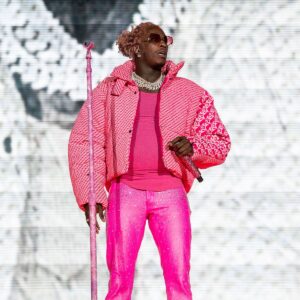

Rapper Young Thug faces a variety of accusations from Atlanta’s Fulton County’s district attorney, such as he was allegedly a founder and active leader of the violent Young Slime Life street gang.
The 80-plus page indictment charges both Young Thug and another rapper, Gunna, with gang-related crimes, and includes more than 25 others who have allegedly participated in YSL gang activity.
Nine of the rapper’s songs were listed in the indictment as evidence, as an “overt act in furtherance of the conspiracy.”
Such lyrics from the songs include “I never killed anybody but I got something to do with that body,” and “I killed his man in front of his momma.”
The indictment points to these words being used after the murder of Donovan Thomas, the leader of a rival gang. One of the people charged with his death- a member of Thug’s YSL label.
District Attorney Fani Willis answered whether the lyrics were protected under free speech.
“I believe in the First Amendment, it’s one of our most precious rights, However the First Amendment does not protect prosecutors from using it as evidence if it is such,” Willis said Tuesday at a press conference.
However, 11Alive legal analyst Page Pate said it may be hard to use music as proof of a crime.
“The jury is going to want to see evidence that these individuals, each one of these individuals, actually committed some sort of crime separate from just being part of this organization,” Pate explained.
But attorney Darryl Cohen believes, coupled with other evidence, the lyrics add substance.
“It’s just piece by piece, by piece and taken by themselves. They probably don’t mean a lot, but when you put them together, what do you have is a big RICO conspiracy,” Cohen said.
Using rap lyrics as evidence is not new – but there’s conflicting results
Rapper Tekashi69 lyrics were used in his 2018 trial, where it was discovered he was not a gang member, even though he said he was in his songs
In 2016, rapper Tay K was convicted of murder, using a music video as evidence
And in 2018, rapper Vonte Skinner’s lyrics were used in his attempted murder trial. His conviction was overturned when the New Jersey Supreme Court ruled the jury wouldn’t have found him guilty, if they weren’t made to listen to the lyrics.
Still, Cohen believes Willis’s tactic of using Thug’s music as proof of gang activity- is the right way to go.
“If you think about lyrics, they’re nothing other than words put to music. Your thoughts can be protected by the First Amendment, as long as your thoughts don’t play out into something that’s violent, something that’s illegal.”
Thug’s attorney maintains Thug’s rap label is not a street gang and there’s no basis to include the rapper in the indictment.
Attorneys not associated with this case said even if Thug is a member of a gang, it will be a challenge to prove he had knowledge and intent of crimes committed by other members.